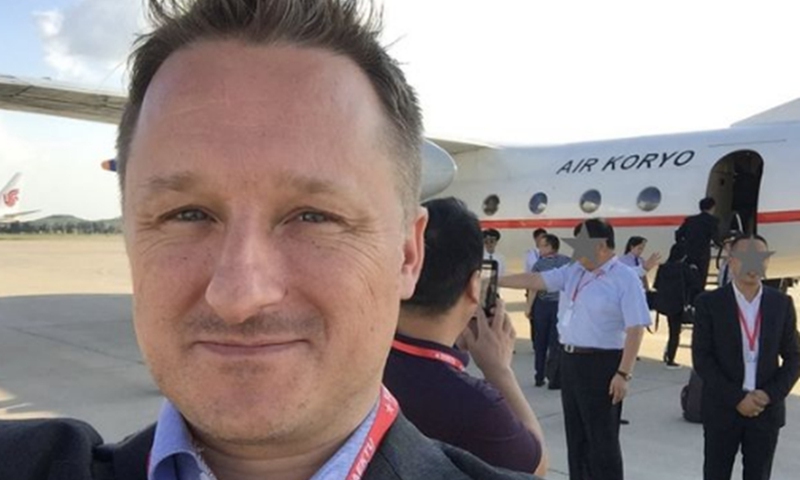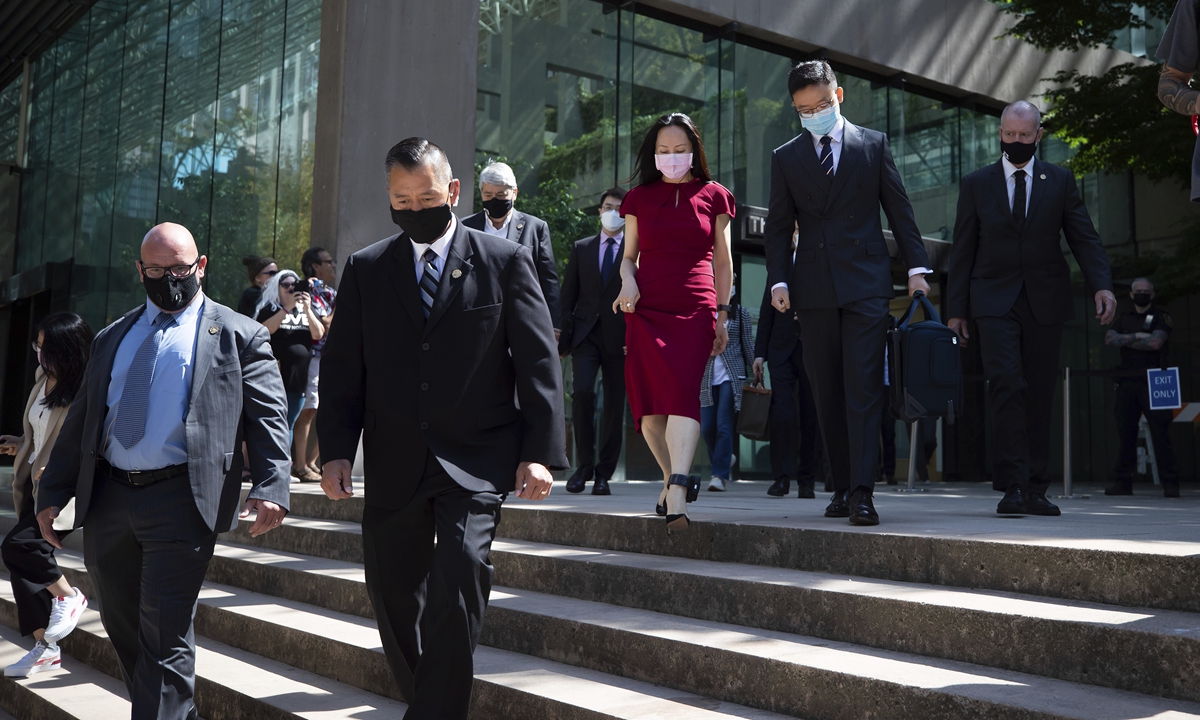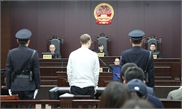Canadian businessman jailed for 11 years for spying in verdict showing China’s resolve to safeguard judicial integrity

File photo: Michael Spavor
A court in China on Wednesday sentenced Canadian businessman Michael Spavor to 11 years for foreign espionage and the illegal provision of state secrets, a day after the death sentence of a convicted Canadian drug trafficker was upheld, in what analysts called a clear show of China's resolve and determination to safeguard its independent judicial system and national interests despite baseless attacks and mounting pressure from the West.
The closely-watched court ruling, which also ordered the deportation of Spavor, came as bilateral relations between China and Canada are at the lowest point due to Canada's arrest of Huawei CFO Meng Wanzhou at the behest of the US and its constant disregard of international norms and China's concerns.
Following the court rulings, Canada has been rallying support from some of its Western allies to attack China, but Chinese officials have dismissed the criticism as baseless accusations and blatant interference into China's judicial proceedings. The court rulings have also been widely applauded by the Chinese public as a crucial, necessary step to protect the public and the country from drugs and foreign espionage, especially given the constant unreasonable provocation from the Canadian government.
Chinese experts on foreign affairs pointed out that the sentence conveyed a signal to other US allies that they will pay heavy price if they insist on being the US' "running dogs" in its anti-China camp and their citizens would face harsh punishment if they commit crimes in China as their nationality is not a talisman.
Verdict announced
Dandong Intermediate People's Court in Northeast China's Liaoning Province announced the verdict on Wednesday, five months after his first trial in a closed-door court in Dandong as it concerns national security. He also had personal property of 50,000 yuan ($7,700) confiscated and will be expelled. According to Chinese legal proceedings, he will have 10 days to appeal.
Another Canadian national Michael Kovrig along with Spavor was prosecuted for suspected crimes undermining China's national security in June 2020 and received trial in March at a Beijing court. Kovrig was accused of using an ordinary passport and business visa to enter China to steal sensitive information and intelligence through contacts in China since 2017, while Spavor was accused of being a key source of intelligence for Kovrig.
Speaking from Dandong on Wednesday, Canadian Ambassador to China Dominic Barton said his government condemned "in the strongest possible terms" the sentence handed down to Spavor, according to a CNN report.
Canadian Prime Minister Justin Trudeau denounced Spavor's sentencing Wednesday as "absolutely unacceptable and unjust," while the US and Australia embassies in China also joined in the chorus to attack China over the sentence on their official Sina Weibo accounts.
Chinese experts slammed them for being "blind" and "stubborn" and having nothing new to present but these lousy clichés as Chinese Foreign Ministry spokespersons have reiterated the status of both cases and China's judicial authorities have released information timely about the cases.
A source close to the matter told the Global Times previously that due to the COVID-19 epidemic situation, the hearings for both cases involving Kovrig and Spavor had yet to commence. Meanwhile, Global Affairs Canada, which manages the Canadian government's diplomatic and consular relations, issued a statement in October 2020, noting that Ambassador Barton conducted a consular video visit with the two.
Referring to previous cases of outbreaks in prisons at home and abroad, for the humanitarian protection of this special place and the need of domestic epidemic prevention and control, China has not opened up to face-to-face visits. This special "online visit" arrangement was apparently a humanitarian goodwill measure given to Canada by the Chinese government, Liu Dan, a research fellow with the Center for Canadian Studies, Guangdong University of Foreign Studies, said previously.
Barton noted that he did not think it was a coincidence that there were developments in the Spavor and Robert Schellenberg cases while Huawei CFO Meng Wanzhou's case in Canada was progressing. On Tuesday, Canadian drug smuggler Robert Lloyd Schellenberg's death penalty was upheld by the High People's Court of Liaoning Province. He was found guilty of smuggling 222.035 kilograms of meth and being engaged in organized international drug trafficking.
Chinese analysts said from China's perspective, Schellenberg's sentence is a pure criminal case while Spavor's case was not an important factor in relations with Canada and the sentencing was based on Chinese law.
Meanwhile, some Canadian lawmakers and officials have been constantly calling for the release of Meng as they believe Meng's case was highly politicized that led to the detention of the two Canadian nationals in China.
Former Canadian lawmakers and diplomats urged Trudeau to step in to end the extradition trial of Meng, AFP reported in June 2020, as they consider the case as a bargaining chip for releasing Kovrig and Spavor. They said the detention of Meng was a major cause of the souring China-Canadian ties, urging in an open letter that Trudeau should release Meng.
Meng's case is entering its final stage of arguments as a court in Vancouver is hearing arguments from both sides regarding remedies, and the judge will evaluate whether the allegations are valid. It is set to wrap up by August 20.
According to Meng's lawyers, the case was mired in controversy from the beginning, including the politicization of it by former US president Donald Trump, violations of Meng's rights during her arrest, the US' misleading evidence and is a brazen violation of customary international law.
The case has been widely considered a "political hot potato," damaging China-Canada relations over the past few years. The Chinese Foreign Ministry has repeatedly called the case a political maneuver, and urged Canada to release Meng.
Gary Botting, a Canadian legal expert and author of several books on extradition, told the Global Times in an earlier interview that the case was a political gambit from the outset in a bid to throw cold water on Huawei's aspirations to promote its 5G technology.

Meng Wanzhou, chief financial officer of Huawei, leaves the B.C. Supreme Court during a break in her extradition hearing on Tuesday local time in Vancouver, British Columbia. Photo: VCG
Stop being US running dog
The two cases involving the Canadians have drawn wide coverage from Western media, which portrayed the Trudeau government as an "innocent victim," and described the verdicts as big tests for the strained relationship between Canada and China and hyped the sentencing as plunging China-Canada relations to their lowest point in decades.
"Trudeau should know his government's choice of being a US running dog is the reason behind the frosty bilateral ties and following allies' steps to pressure China won't put an end to the dilemma of the China-Canada relationship," Wu Xinbo, director of the Center for American Studies at Fudan University in Shanghai, told the Global Times on Wednesday.
Canada's attempt to pressure China by using "Megaphone Diplomacy" or ganging up is totally futile and will only head toward a dead end, Wu said.
Li Haidong, a professor at the Institute of International Relations of China Foreign Affairs University, pointed out that the so-called support from the US and its allies further proved that those countries have been colluding with each other on containing China, which only makes the situation worse as China will not yield to political coercion.
Trudeau is in an embarrassing position given the current dilemma with two Michaels, facing opposition domestically and internationally, which shows that he lacks political wisdom, he noted.
"If he can't properly handle this dilemma, it would only cast a shadow over the upcoming election," Li said.
The Dandong court said Spavor would be deported, but did not specify whether it would be before or after he serves his prison sentence.
According to China's Criminal Law, if a foreigner is sentenced to a fixed-term imprisonment and subject to deportation at the same time, the foreigner shall serve the sentence and then be deported by police. The foreigner will be not allowed to enter China for a certain period of time.
The icy relationship between Beijing and Ottawa will only be resolved if Canada is willing to commit itself to pushing forward bilateral ties and distancing itself from the poisonous impact of US' hostile policy toward China, experts noted.



